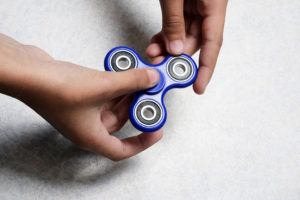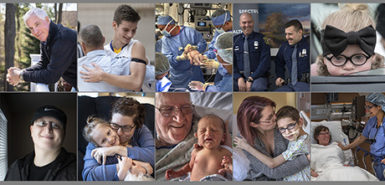
Six weeks ago, a patient with Attention Deficit Hyperactivity Disorder came to a therapy appointment with something in his hands that his doctor, Brittany Barber Garcia, PhD, had never seen before.
“I said, ‘What is that?’ and he said, ‘A fidget spinner,’” said Dr. Barber Garcia, a pediatric psychologist at Spectrum Health Helen DeVos Children’s Hospital. “So I said, ‘Wow, that’s really interesting. Does it help?’ He said it did.”
She said she then watched him focus better throughout their 60-minute session than ever before.
Since then, she’s seen more and more of the small, spinning toys in the hands of other children—including those without ADHD, for whom the toy can have a different effect.
As the fidget spinner craze has spread across the country, doctors have warned that though it’s not a treatment for ADHD—it may help.
“Kids with ADHD have an almost constant need for stimulation and input from their environment,” Dr. Barber Garcia said. “When they can use a fidget spinner or another toy to be that background stimulation, it can do just that and stay in the background for them. It allows them to better focus on the task at hand.”
For children who do not have a true attention deficit problem, the fidget spinners can often take attention away from the task at hand, she said.
“We have all seen someone who taps their pencil or finger while they’re reading,” she said. “It helps them focus better. But it can be distracting for other people.”
Sensory stimulation
Although fidget spinners have been around since the 1990s, they became popular among kids earlier this year. Stores can hardly keep them on the shelves. Along with the demand, their price has jumped.
The toys have caused a dilemma for schools, with some banning them because of the distraction they are causing.
According to news reports, a Houston, Texas, mother said her 10-year-old daughter choked after swallowing one of the bearings from her fidget spinner. Doctors had to remove it in endoscopic surgery, the mother said.
In developing treatment plans for patients over the years, Dr. Barber Garcia has noted that some children could benefit from having something to fidget with in their hands at school. She has recommended sensory stimulation objects, such as silly putty or squeezable stress balls, to help children cope with stressful situations, anxiety or ADHD.
To parents facing a potential problem with how to handle the latest craze, she offers this advice: “Should kids be allowed to play with them? Sure, they’re a toy just like any other toy.
“But I would caution against sending them to school for kids who do not have ADHD, because they may end up being a distraction to them and disruptive to other kids,” she added. “Much like we leave other toys at home, it’s probably best to leave these at home, too.”
With schools banning the fidget spinners, however, she worries that kids with ADHD—who actually do benefit from having the device—will suffer.
“Some kids can benefit from using them,” she said.
A small toy such as a stress ball can be used as an alternative, or children can also try rubbing their fingers over Velcro, Dr. Barber Garcia said.
Bold claims
Aniruddh Behere, MD, a pediatric psychiatrist at Helen DeVos Children’s Hospital, had also been introduced to fidget spinners when one of his patients brought one in.
While some small studies have shown that devices such as wiggly chairs and hand-held fidgets may help with attention and concentration among children with ADHD, they should not be considered a treatment for the disorder, Dr. Behere said.
“Certainly, it may provide a good distraction,” he said. “But it’s difficult to say that it can help with ADHD. We cannot say that until more scientific studies are done and we know more about it.”
He’s concerned about companies making bold claims about the benefits of fidget spinners for kids with ADHD.
“These are things that work in conjunction with medication, but parents should not think it replaces medications,” Dr. Behere said.
A child with ADHD should be accurately diagnosed by a health professional who can consider all of the well-studied treatment options, including medications and working with a cognitive behavioral therapist, he said.
Drs. Barber Garcia and Behere agree that, like all fads, the craze will soon die down.
“There’s just a lot of hype about it, and soon they will move on to the next thing,” Dr. Behere said.
 /a>
/a>
 /a>
/a>
 /a>
/a>
The new fidget spinner craze is remarkable! I see adults, teens and children playing with them everywhere I go!! They come in a variety of colors and shapes making them even more fascinating.
may want to look into fidget rings they would not be so distracting to others around you
As a teacher with a private music studeo, I have a student who’s been diagnosed as ADHD, so I may have to get my hands on one of these!